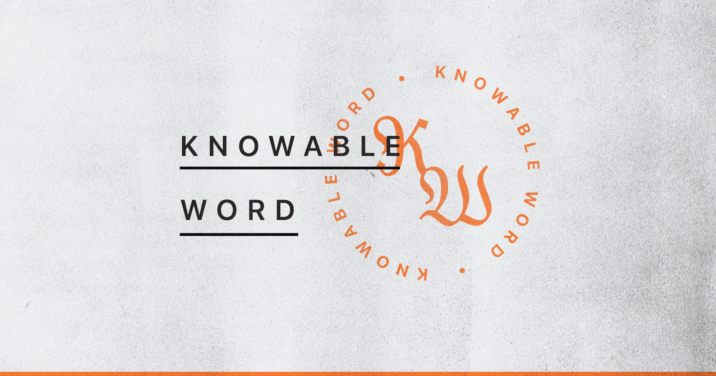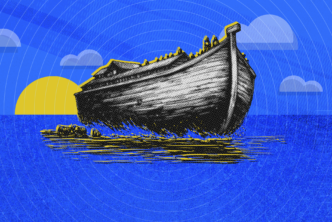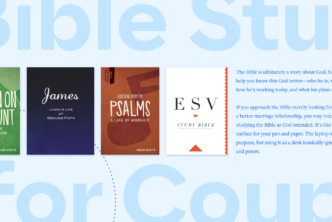Whenever my laptop or smartphone gets stuck, I always hear the same preliminary advice: try to reboot. For some reason, shutting the technology down and starting it back up again tends to shake things loose and get them back where they’re supposed to be. In a similar way, the book of Genesis shows God not only creating the heavens and the earth but also being willing to hit reboot when things get stuck.
In part 1 of this study (Gen 1:1–6:8), we examined the initial creation along with humanity’s three great falls—rebellion in the garden, brotherly strife in the surrounding land, and global intermarriage. In the end, God decided to blot out humanity (Gen 6:7), yet he had favor on Noah (Gen 6:8). That’s where we pick up the story of our ancient history.
Week 1: For God So Loved the World
There is probably no children’s Bible on earth that leaves out the story of Noah’s ark, and probably every church nursery on earth has Noah’s ark animal toys or decor. We tell and hear this story so frequently that we can deceive ourselves into thinking we already understand it. As a result, we might fail to observe it as we ought.
But would you be willing to try setting aside your familiarity with the story so you can truly observe the text which the Holy Spirit inspired? The flood is one of the longest narrative episodes in the Bible, and each part of it serves a purpose. We’ll take the next four weeks to see if we can uncover that purpose, so that we might be transformed by it.
First, we learn about the character of Noah and the intentions of God. Read Genesis 6:9–22 a few times.
How is Noah’s character described? What evidence is presented in this text to support that description of Noah?
What are God’s intentions in v. 13? Why will he do this? But what does he spend most of his speech on (vv. 14–21)? In light of his stated intentions, why does he spend so much time on the latter topic?
Remember also that we’ve already been through more than five chapters of God’s work in creation by the time we get to this narrative. How do the details of this text hark back to what came before? In particular:
- Which other character is Noah like (righteous, walks with God, has three sons)?
- Where else have we been told that “God saw” something on earth (v. 12)?
- Where have we seen wood, water, animals, and food all in the same place before?
- The ark Noah builds is supposed to have three decks (v. 16). Where in Genesis before this have we seen something described in triple-decker layout?
- And most importantly: Why does this text make all these connections back to chapters 1–4? What do those connections suggest about God’s purpose here?
Once you’ve labored to identify these connections and to consider their meaning for yourself, see Study Note [A] at the end of this study if you’d like more help.
Read John 3:16–17 and 2 Peter 2:4–10. What does God’s speech to Noah teach us about the Lord Jesus Christ? How can you deepen your trust in him in the midst of a crooked and perverse generation?
Week 2: Decreation
In Genesis 7, the promised flood (6:17) arrives. Let’s take a closer look at how it arrives and why God does what he does.
Read Genesis 7 a few times. As you read, look for markers of time to divide the passage into sections.
In the first section (vv. 1–10), God speaks and Noah responds. What is the first thing God wants Noah to do? Why? What is the second thing God wants him to do? Why? How does Noah respond?
In the second section (vv. 11–16), time appears to slow down and even stand still, as the (literally) earth-shattering moment arrives. How does the text show God keeping his word and protecting those on earth who likewise keep his word (v. 16)?
And what does that word entail? The third section (vv. 17–24) describes the flood’s progress in great detail. Why do you think the narrative describes the rising water line in this manner? What effect does it have on you as a reader?
Now let’s do one more thing before moving on from this chapter. Go back and reread chapter 1 and chapter 7 again, back-to-back. Make a list of all of the similarities and differences between them. Take special note of the reversals between them. For example:
- Waters above are separated from waters below in Gen 2:7, but waters above and waters below are reunited in Gen 7:11.
- Dry land appears in Gen 2:9, but it disappears in Gen 7:19.
Find as many connections and reversals as you can, and then ask: Why is the story told in this way? What is the narrator communicating by telling the story of the flood with this language of reversing the creation of chapter 1? What does this teach us about the nature of God’s judgment on sin, the effect of human sin on the created order, and the role of humans in either a world under God’s blessing or a world under God’s judgment
Why is the story told in this way?
Week 3: Recreation
On the list you made at the end of last week’s study, I hope you noticed that the world ends up as a complete watery chaos (Gen 7:24), just like it was before the Spirit of God did his initial work of creation (Gen 1:2). Because that’s where we are in the story: back to the beginning state of affairs. But this time there’s something more. There is not only a watery chaos, but also a floating mini-cosmos—headed up by him whom the Lord has favored (Gen 6:8)—bobbing along, waiting to see what God might do.
With that in mind, read Genesis 8:1–19 a few times.
Take your list comparing chapter 1 with chapter 7, and now add a third column for chapter 8. List all the connections and reversals of those previous chapters presented in the current passage. I’ll get you started once more:
- Waters above and waters below are separated once more (Gen 8:2–3).
- Dry land reappears (Gen 8:4–5).
Find as many connections and reversals as you can, and then ask: Why is the story told in this way? What is the narrator communicating by telling the story of the flood with this language of redoing the creation of chapter 1? What does this teach us about the intentions of God for his creation and the role of his new creation people within those intentions? How is Noah like Jesus, and how can you make sure to hop aboard the Son of God’s boat to be rescued from disaster (1 Peter 3:18–22)?
What does this teach us about the intentions of God for his creation?
Week 4: New Commission & Covenant
The flood was nothing short of a complete undoing—and then rebooting—of creation. Noah is like a new Adam, with a new human family. The world has been washed clean and made ready for this next Adam to inhabit, rule, and subdue. What does it now look like for the new humanity to walk with God in the new creation?
Read Genesis 8:20–9:19 a few times. The parallels between Noah and Adam continue; how many can you notice? Make your own list before reading on.
Noah offers a pleasing sacrifice, just like Abel and unlike Cain (Gen 4:3–5). Though Abel’s father Adam rebelled, leading God to curse the ground (Gen 3:17), God assures Noah that he will never again do so because of man (Gen 8:21). Why? Not because humanity no longer deserves it, but only because of his mercy. What do these opening verses (Gen 8:20–22) teach us about the nature of sin and the purpose of the flood? See Study Note [B].
God blesses Noah, giving him a commission to be fruitful and multiply, just like he blessed and commissioned the first male and female humans (Gen 1:27–28; 9:1–2, 7). Just as he did with Adam, God provides food for Noah (Gen 1:30, 9:3–4). But unlike Adam, Noah also receives guidance for life in a new creation populated by sinners (Gen 9:5–6). No longer will the Cains of the world be allowed to go unpunished (Gen 4:15). Though sin has not yet been fully dealt with, society will now have lawful mechanisms to restrain it.
God makes a covenant (a binding agreement) with Noah. Though Gen 6:18 and 9:9 are the first occurrences of the particular word “covenant,” it’s not difficult to see the concept already present between God and Adam in chapters 1–3. But now the covenant’s sign is not a tree of life whereby man can eat and live forever (3:22); the covenant’s sign is a warbow aimed toward the heavens (9:12–17).1
Whenever God is reminded of human sinfulness, he is also, now and forever, reminded that he himself will pay the cost of it. Perhaps that will be more effective at dealing with the problem of sin once and for all than a devastating flood.
The covenant’s sign is a warbow aimed toward the heavens.
What does the commission and covenant with Noah suggest about God’s commission and covenant with all of humanity in his new creation? What does it suggest about his commission and covenant with you? How will you live in light of these things?
Week 5: The First Fall Redux
Remember how the first creation was followed by three successive falls on the part of humanity (part 1 of our study, Genesis 1:1–6:8)? Well, sorry to spoil what’s coming, but we’re going to see them again. God undid—and then redid—his creation, but the reboot was not effective at removing sin from human hearts. And the book of Genesis wants you to see so for yourself.
The first fall took place when Adam rebelled against God’s authority over him in the garden. With that in mind, read Genesis 9:20–29 a few times. This passage is often confusing and controversial, but the big idea ought to be clear when we read it in the context of what’s come before.
Adam was a gardener, and Noah now takes gardening another step to become a vintner (9:20). Then stuff happens, and something awful goes down in his tent. Awful enough to outrage Noah and turn him against … his grandson (v. 25)? What is going on here?
If we keep our attention on what is clear, the main idea should not elude us. Regardless of any visceral reaction you may have to Noah’s drunkenness, on whom does the text clearly lay the blame for the tent incident? When Noah wakes up, he pronounces curses and blessings in poetic verse, just like God did in chapter 3. If, in a similar way, the punishment fits the crime, what does the curse of v. 25 suggest about what the chief offense was? (See Note [C].) That punishment is repeated within the blessings of verses 26 and 27 to reinforce it.
Some things have changed, but many others have remained the same. How do we still face humanity’s proclivity to rebel against God’s authority, or against those whom God has appointed? How do you wrestle with such rebellious attitudes in your own heart and life? How does Jesus show us a different way?
Week 6: The Second Fall Redux
The first time around, Adam’s rebellion was followed by Cain’s murder of his brother (Gen 4:8). As humanity moves out from its new garden (Noah’s vineyard) into the surrounding land, what do you expect we’ll find?
Read Genesis 10:1–32 a few times.
We start off well enough, with sons being born after the flood (Gen 10:1). But there is a sinister undercurrent, as the birth of sons was also the first thing narrated after Adam’s fall from the garden (Gen 4:1–2).
Let’s focus this study on how the chapter advances the plot threads we’ve been following from the beginning of creation.
This chapter holds buckets of gold nuggets that set the stage for the rest of the Old Testament’s historical narratives, but let’s focus this study on how the chapter advances the plot threads we’ve been following from the beginning of creation.
When we reach the “sons of Ham” in verse 6, we’re already trained by 9:20–29 to picture a mustache-twirling villain who lives for no one but himself. So when we read of Ham’s grandson Nimrod, the first on earth to be a mighty man (10:8), we must tread carefully. We remember how Cain’s descendants were the first on earth to develop craftsmanship, the arts, and technology (Gen 4:21–22). This feels like more than a bit of deja vu.
They called him “a mighty hunter.” And what was his quarry? “The beginning of his kingdom was Babel, Erech, Accad, etc.” He then went on to found Assyria, building Nineveh and other cities. When such names are invoked, our hackles ought to stand at attention. When one builds kingdoms, especially ones like Babylon and Assyria, one must hunt men. In other words, with Nimrod, we have a new Cain: one who goes about attacking and murdering men, perhaps even brothers, to build his self-glorifying city-states (Gen 4:17).2
Some things have changed, but many others have remained the same. How do we still face humanity’s proclivity to fight and quarrel, trampling others for the sake of gaining more power, wealth, or fame? How do you wrestle with such selfish attitudes in your own heart and life? How does Jesus show us a different way?
Week 7: The Third Fall Redux
The first time around, Cain’s murder was followed by global intermarriage and catastrophic judgment (Gen 6:1–3). As our narrative takes on a more global setting, what do you expect we’ll find?
Read Genesis 11:1–26 a few times.
The Tower of Babel story is one of the most brilliant and compact tales in the Bible. Those who wanted to make a name for themselves (Gen 11:4) failed so utterly that the author refuses to even name them in this text. And the author is so successful in his craft that many people today fail to realize he’s already told us exactly what the names were of the people who were there.
We were already told of a man who began his kingdom in the land of Shinar (Gen 11:2b, 10:10). If it’s not apparent, you should know that Babel and Babylon are the same Hebrew word, the same place.
We were already told of a family that was migrating east (Gen 11:2a, 10:26–30). We were even tipped off to the fact that “the earth was divided” in the days of the two sons of Eber, Peleg and Joktan (Gen 10:25). Joktan took his 13 sons east and got cut off from the genealogy of the offspring of promise (Gen 11:16).
So what do we have at Babel? Nimrod (descendant of Ham) hooks up with Joktan (descendant of Shem) and tries to unite humanity in opposition to God. We have a global “intermarriage” of the children of promise and the children of the curse. And God must come down to see the puny works of their hands and scatter them.
In modern times, some things have changed, but many others have remained the same. How do we still face humanity’s proclivity to compromise truth and unite under delusion? How do you wrestle with such compromising attitudes in your own heart and life? How does Jesus show us a different way?
How does Jesus show us a different way?
At Babel, they labored for a name, a nation, and an influence over the whole world (Gen 11:4). God took it all away, but is it inherently sinful to have such things? What if God chooses to give them freely to someone else? Just keep reading into the story of Abraham to see what it means to not work for such things but receive them by faith.
Study Notes
[A] Noah is like a new Adam. God’s speech to Noah is like a new act of creation (similar to Genesis 1). The ark is like the triple-decker creation—heavens, earth, water under the earth—but also like the Garden of Eden, with trees/wood, man and wife, animals, food, and water. In short, Genesis 6:9–22 shows God initiating a new act of creation, through the rescue of Noah, in the midst of his coming judgment to wipe out the old creation. Even when God executes catastrophic judgment, he can’t help but be a God who saves that which he loves. It’s as though he will take the entire created order and symbolically squish it into this boat for a time, to rescue it, while he goes about his work of “making an end of all flesh” (Gen 6:13). [B] Compare Genesis 8:21 with Genesis 6:5, and you’ll see that the flood may have been the most outrageously graphic and catastrophic object lesson in the history of the world. So let’s make sure not to miss the point: The unflinching and implacable undoing of all creation may effectively wash life from the face of the earth, but it will never be able to wash sin from the face of the human heart. That problem requires an entirely different solution. [C] The text puts the blame squarely on Ham for seeing and seeking to exploit his father’s nakedness. Ham was Noah’s youngest son (Gen 9:24), so the curse falls upon Canaan, Ham’s youngest son (see Gen 10:6). “You want to rebel against your father’s authority, do you? Well, let’s see how that goes when your own youngest son likewise fails and must become everyone else’s slave.”Recommended Resources for Further Study of Genesis 6–11
Waltke, Bruce, and Cathi Fredricks. Genesis: A Commentary. Grand Rapids: Zondervan, 2001.
Gage, Warren Austin. The Gospel of Genesis: Studies in Protology and Eschatology, 2nd ed. Eugene: Wipf & Stock, 2001.
***
This article was originally published in the March/April 2022 issue of Bible Study Magazine. Slight adjustments, such as title and subheadings, may be the addition of an editor.
Related articles
- Genesis and Primeval History, Part 1 of 2: Three Falls from Paradise
- What Is the Pentateuch? Plus 15 Best Commentaries for Studying It
- Bible Genealogies and Geography in Genesis
- Bruce Waltke: “Here the warrior’s bow is hung up, pointed away from the earth.” Genesis: A Commentary, (Grand Rapids: Zondervan, 2001), 146. Meredith Kline: “The symbol of divine bellicosity and hostility has been transformed into a token of reconciliation between God and man.” Kingdom Prologue (Eugene: Wipf and Stock, 2006), 152.
- According to the Jerusalem Targum on Genesis 10:9: “He was mighty in hunting and in sin before the Lord; for he was a hunter of the sons of men in their languages. And he said to them, ‘Leave the judgments of Shem, and adhere to the judgments of Nimrod.’ On this account it is said, ‘As Nimrod the mighty, mighty in hunting and in sin before the Lord.’ ” Many commentators, such as Bruce Waltke, follow this tradition: “[Genesis 10:8–12] foreshadows the Tower of Babel and explains the racial, political, and spiritual origin of Babylonia and Assyria, the two great Mesopotamian powers that conquered Israel and held them as exiles. Nimrod founds his empire on naked aggression.” Genesis, 168.






